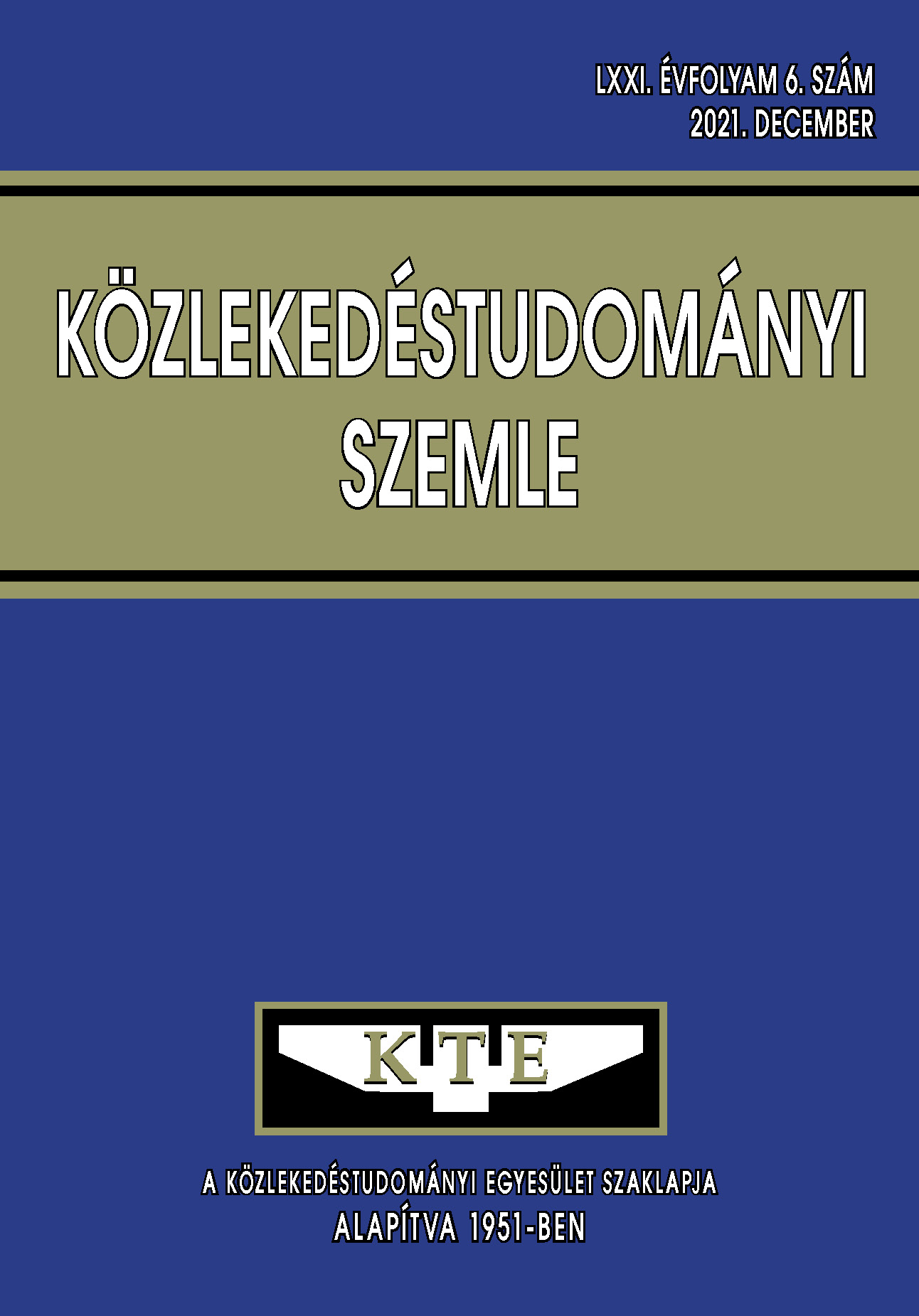Development directions of the urban passenger transport system
Abstract
The transformation of the urban transport system is expected because of technology developments. In this paper, the structural and functional characteristics of the transport system are presented. We summarise the main expected differences between the current and future transport systems. Furthermore, we categorize measures according to aims, effects and policy areas. Our aim is to re-define the transport system and integrate it into a wider system considering social, economic, and environmental aspects.
References
ENSZ (2018): World Urbanization Prospects: The 2018 Revision. https://population.un.org/wup/Download/
Kövesné, Gilicze, É. (2017): A közlekedéstudomány helye, szerepe a hazai tudományos rendszerben. Közlekedéstudományi Szemle, LXVII (2): 7.
Kövesné, Gilicze, É., Debreczeni, G., Csiszár, Cs. (2015): Személyközlekedés. Felsőoktatási jegyzet.
Kövesné, Gilicze, É. (2007): A fenntartható felszíni közlekedés fejlesztésének rendszerkapcsolatai. Innováció és fenntartható felszíni közlekedés konferencia, Budapest. 1-8.
Westsik, Gy. (1982): Közlekedési rendszertervezés. Tankönyvkiadó
Piet, R. (2011): The Economics of Information in Transport. A Handbook of Transport Economics (szerk. Palma, A.,
Lindsey, R., Quinet, E., Vickerman, R.), Edward Elgar, Cheltenham, 586-603. ISBN: 978 1 84720 203 1
Flügge, Barbara (eds.) (2017): Smart Mobility – Connecting Everyone - Trends, Concepts and Best Practices-Springer Vieweg (2017) DOI: https://doi.org/ggkpkw
Rietmann, N., Hügler, B., Lieven, T. (2020): Forecasting the trajectory of electric vehicle sales and the consequences for worldwide CO2 emissions. Journal of Cleaner Production, 261: 121038. DOI: https://doi.org/g4n6
Alonso, M., Amaris, H., Germain, J. G., Galan, J. M. (2014): Optimal Charging Scheduling of Electric Vehicles in Smart Grids by Heuristic Algorithms. Energies, 7(4): 2449-2475. DOI: https://doi.org/f54bf9
Csonka, B. (2020): Centralized charging power distribution method for electric vehicles. 2020 Smart City Symposium Prague (SCSP). DOI: https://doi.org/g4n7
van Arem, B., Aki Ackerman, A., Chang, T., Riggs, W., Wegscheider, A., Smith, S., Rupprecht, S. (2019): Building Automation into Urban and Metropolitan Mobility Planning. Road Vehicle Automation 6. AVS 2019. Lecture Notes in Mobility. 123-136. (ed. Meyer, G., Beiker, S.). Springer, Cham DOI: https://doi.org/g4n8
Spieser, K., Ballantyne, K., Treleaven, K., Zhang, R., Frazzoli, E., Morton, D., Pavone, M. (2014): Toward a Systematic Approach to the Design and Evaluation of Automated Mobility-on-demand Systems: a Case Study in Singapore. Road Vehicle Automation. Lecture Notes in Mobility (ed. Meyer, G., Beiker, S.). Springer, Cham DOI: https://doi.org/g4n9
Lu, Z., Du, R., Dunham-Jones, R., Park, H., Crittenden, J. (2017): Data-Enabled Public Preferences Inform Integration of Autonomous Vehicles with Transit-Oriented Development in Atlanta. Cities, 63: 118–127. DOI: https://doi.org/f9xr4f
Cao, Z., Ceder, A. (2019): Autonomous Shuttle Bus Service Timetabling and Vehicle Scheduling Using Skip-stop Tactic. Transportation Research Part C: Emerging Technologies, 102: 370-395. DOI: https://doi.org/g4pb
Articles published electronically are open access (OJS), freely available online and can be downloaded. Authors of articles are not charged any publication or publishing costs (APC). Users have the right to read, download, copy, print, and search the articles, or share the full text with a link.
Authors must declare that their submission has not been previously published in another journal, that financial support has been acknowledged, and that the list of references is complete and accurate, including specification of URLs and DOIs (if available). When submitting a draft article, each author approves the submitted version. Authors guarantee that the article is their original work. Authors are required to participate in the peer review process, follow the advice of reviewers, meet the prescribed deadlines, and, if any, withdraw the submission or correct errors.
All submitted articles are subject to peer review, where the editors request an independent evaluation from at least one expert, ensuring that the reviewer(s) have no conflicts of interest with the authors. The final decision is made by the Editor-in-Chief, who takes into account the evaluations and the suggestions of the editors. The editors and reviewers treat the submission confidentially.
The publisher and editors are committed to maintaining high ethical standards and to preventing publications that involve research misconduct. They follow the COPE guidelines on such ethical issues.
The authors retain copyright and grant the journal the right of first publication under the Creative Commons License (https://creativecommons.org/licenses/by-nc-nd/4.0), which allows others to share the work, while acknowledging the authorship of the work and the first publication in the journal.
The journal archives all published articles, and the journal's owner, the Hungarian Society of Transportation Sciences, will continue to operate the database even if the journal ceases to be published.















